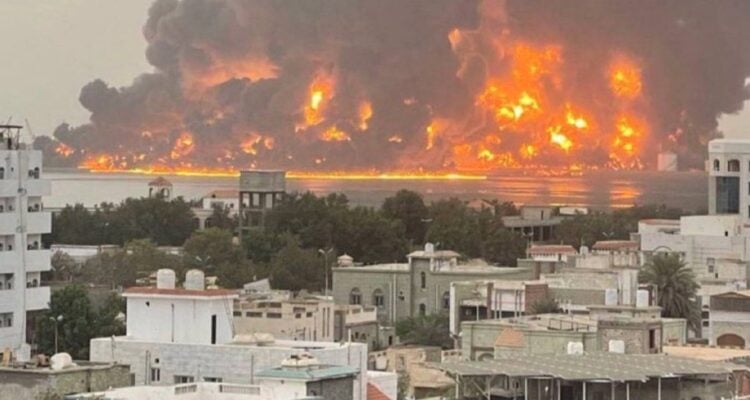There are logistical and operational challenges associated with IAF missions over 2,000 kilometers (1,250 miles) away against an elusive enemy like the Houthis.
By Yaakov Lappin, JNS
For two consecutive nights on Dec. 24 and 25, 2024, air raid sirens sent millions of Israelis for cover as the Houthi terror regime in Yemen each day fired a ballistic missile at the country.
Israel’s Arrow system intercepted those missiles, but before dawn on Dec. 21, a Houthi attack reportedly featured a re-entry warhead capable of maneuvering following separation from its engine.
That missile was not intercepted and crashed into a Ramat Gan school. No one was injured as it was well before the school day.
Despite the IDF’s previous precision strikes on Yemeni energy infrastructure and ports, the threat persists. This suggests that additional offensive measures such as missiles may be necessary.
However, warned Israeli Navy Cmdr. (res.) Eyal Pinko, a researcher at the Begin-Sadat Center for Strategic Studies at Bar-Ilan University in Ramat Gan, missile attacks alone will not be sufficient to end the threat.
“In my assessment, the Houthi leadership has gone underground. Their infrastructure, like missile bases and weapons storage sites, can be attacked [with missiles]. This will cause damage, but it won’t be enough to subdue them,” he told JNS on Wednesday.
According to Pinko, who also served in an intelligence organization, “We need a much more massive attack from the air and sea. The maritime threat has to be lifted, and not only their missile array. Since the Saudis and Egyptians struck them from the air for a duration of eight years and did not succeed in subduing them, I doubt that hitting them with missiles alone will succeed, including striking their infrastructure.”
Over the past 14 months, the Houthis have launched hundreds of missiles and UAVs targeting Israel. These attacks not only violate international law, but also pose a clear and ongoing threat to regional security and stability.
In response, Israel has carried out a series of airstrikes targeting Houthi ports and energy infrastructure, showcasing the IDF’s long-range operational capabilities. However, the strikes also highlighted their inherent limitations.
2,000 kilometers
There are logistical and operational challenges associated with IAF missions over 2,000 kilometers (1,250 miles) away against an elusive enemy like the Houthis.
As explained last week by IDF International Spokesperson Lt. Col. Nadav Shoshani, these operations demand significant intelligence preparation, operational coordination, and time for implementation.
For instance, the IAF strike on Dec. 19 required two separate waves of attacks involving 14 fighter jets and multiple aircraft types.
While the IDF has refined its ability to carry out such missions, these operations cannot match the speed and immediacy that missiles offer.
As it is impossible to prepare and execute an airstrike within minutes of receiving actionable intelligence or an order from manned aircraft, complementing the IAF’s impressive capabilities with missile firepower seems like a logical step.
A missile-based attack system would enable Israel to launch immediate, weather-agnostic strikes in response to emerging threats. Furthermore, a ground-based missile corps would have a small maintenance and operational footprint without endangering aircrews.
Pinko added that it is critical to sever the Houthis’ supply line from Iran, to attack Sanaa, and to completely paralyze all of the Houthi infrastructure.
In recent years, the Houthi arsenal has grown increasingly sophisticated, with Iranian support playing a key role in transforming its ballistic and cruise missile capabilities.
Iranian Supreme Leader Ayatollah Ali Khamenei spent over a decade ensuring that proxies such as Hezbollah and the Houthis possess advanced precision-guided weaponry, effectively creating a surrogate “air force.”
A large-scale attack on the Houthis, Pinko emphasized, “has to be a joint Israeli, American, British, Saudi and Egyptian operation.”
Israeli missiles, if they are acquired, alone may not be sufficient, but they can help further diversify Israel’s offensive toolkit.
A missile corps would not only complement the IAF, but also provide options for rapid response and degrading Houthi infrastructure with minimal operational delays.





